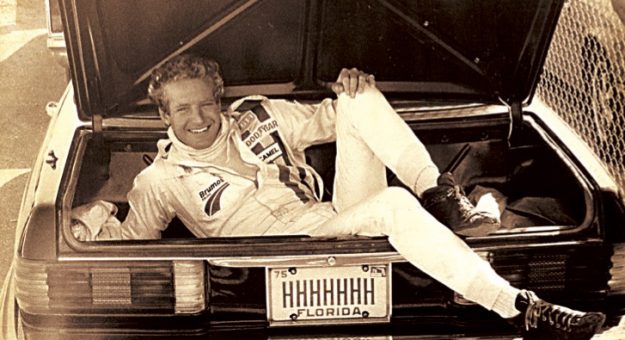Gregg took his own life on Dec. 15, 1980, but the Brumos organization has carried on with Haywood serving in a variety of roles through the years.
“The association with Brumos was so strong, and that has been the basic fabric of my racing career. Brumos Porsche was one of the most recognizable racing names – not only in Florida, but all over the world. I’m very proud of that,” said Haywood. “At first, Peter would give me odd jobs to do around the dealerships. Basically, my entire professional career has been around Brumos in different variations. I was vice president of Brumos for a while and then I became an owner. It’s just been a wonderful association with one company.
“When we sold the dealerships five years ago, Dan Davis was very exact in keeping the name, so we control the name Brumos and we have the Brumos Collection, which is a phenomenal collection of cars in a beautiful building.” (see separate story)
Haywood was inducted into the Motorsports Hall of Fame of America in 2005. His endurance racing stats include five overall victories in the Rolex 24 At Daytona, three wins at the 24 Hours of Le Mans and a pair of triumphs in the 12 Hours of Sebring. He also has two IMSA titles and a Trans-Am championship.
“You have to have a mindset that is tuned to almost like playing chest,” Haywood responded when asked about the key to his endurance racing success. “You have to plan your mission; have in your mind what you want to do. And you have to adapt very quickly to changing conditions. If you look at the guys that are successful in long-distance races, your platform changes every lap – the car changes, the track changes, traffic scenarios change, and the guys that can adapt to that quickly are the ones that have the greater chance of being successful.
“Those that get locked into one way of driving, if that changes, they go downhill,” Haywood continued. “I think the ability to adapt to change is one of the keys, and I’m also patient. I don’t take unnecessary chances and I wait for the opportunities to avail themselves, and that’s what you have to do in a long-distance race.”
Today, at age 73, Haywood’s life is literally an open book, which is in stark contrast to the secret he kept private throughout his racing career. In his 2018 autobiography, “Hurley From The Beginning,” Haywood revealed that he is gay.
“There’s been a book and a movie, so fans know just about everything about me,” Haywood said. “They went in-depth on my racing career and my personal life. Both of those items together give a pretty in-depth analysis of me, Hurley Haywood the person.
“We backed that up — Sean Cridland, who helped me write the book, is also doing a three-volume book on the history of Brumos, which is really an enormous project and people can pull that up on the internet to look at what that’s all about. I’m proud of that. I’m proud of the documentary that Patrick Dempsey did and also the book that Sean and I did.”
Haywood ran his last prototype race — which he won with co-driver Joao Barbosa — in 2009 at Florida’s Homestead-Miami Speedway, but he continues to be a respected figure in the sports car industry.
“I’m still an ambassador for Porsche, so I’m leaving next week to go to the L.A. Auto Show,” Haywood said. “I don’t really have anything to do with the dealerships, selling cars, anymore, but I’m associated and do events for them, which keeps my name out there in the automobile industry. And people listen to what I have to say when it comes to the racing industry. I have a good balance with my business life and my private life.”
As for his racing career, Haywood believes he left it all on the table.
“An interesting statistic is that I won my first race in 1969 — the 6 Hours at Watkins Glen. And I won my last race in a prototype in 2009 at Homestead. I won races in five decades,” he noted. “I have no regrets. I tried the Formula 1 thing. I had a test over in Europe with Bernie Ecclestone, but at the time those cars were dangerous. People were getting killed left and right. I also ran the Indianapolis 500. I had started a really good relationship with Porsche and I decided I was going to keep after it — and that was the right decision.”
